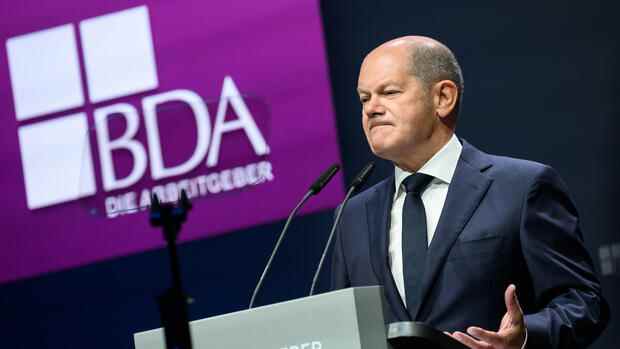SMEs were not included in the third relief package with a volume of a whopping 65 billion euros.
(Photo: dpa)
In no Sunday speech by a politician should the reference to the middle class and its fateful importance for Germany be missing. These stories are teeming with strong entrepreneurs who work in the engine room of the economy to create our prosperity.
The reality is different: Germany is a sad country. The engine room is full of water and after the Employers’ Day in Berlin it’s clear: the level is rising inexorably.
Craftsmen, freelancers and family entrepreneurs who expected a concrete relief program from Chancellor Olaf Scholz and his ministers Robert Habeck and Christian Lindner in view of the energy crisis have been disappointed.
There were a lot of warm words, that was it. SMEs were not included in the third relief package with a volume of a whopping 65 billion euros. Now the government wants to make adjustments. Only, there is no solution in sight. Economics ministers and finance ministers still have to come to an agreement, and approval from Brussels is uncertain.
Top jobs of the day
Find the best jobs now and
be notified by email.
That leaves Federal Minister of Economics Robert Habeck, who would rather beg for energy from all over the world than use domestic resources such as nuclear power plants. With energy prices eight to ten times higher, however, the thickest cushion in the company is not enough to bridge a financial dry spell.
Companies will continue to be burdened
The chancellor wants to get involved with everyone in the crisis. In relation to solidarity with Ukraine, he used the image of the Berlin Airlift at the Employers’ Day. Applied to the economy, one could speak of a bubble bridge. It will continue to be charged. The companies should also pay employees a bonus.
The government could lower energy taxes, for example.
(Photo: dpa)
You have to come to that first in a crisis. The chancellor and his SPD are also very proud of the new citizens’ income. A nice paraphrase for a basic income without benefits, which increases the wage pressure on companies in the crisis.
The government could relieve this. However, there has been no talk of the overdue corporate tax reform for a long time. The complete abolition of the soli, an urgent relief for high-performing companies, must not be left to the Federal Constitutional Court. The list could go on with lowering energy taxes, but then things would get even sadder.
>>Read here: Draft law is available – This is how the EU wants to skim off the profits of oil and gas companies
The Federal Minister of Economics recently said to the Union: “In a few months we will clean up what you screwed up in 16 months”. Good point. However, Germany is at a point where the government has to be careful not to endanger much of what the medium-sized companies and their hard-working employees have built up since 1948.
More: Nuclear power plant reserve, gas levy, TV appearance: this is how the failed decisions are piling up at Habeck
